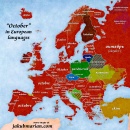 |
‘October’ in European languages
In the Roman calendar, the year began with March, not January, so October was the eighth month of the year—hence the Latin name october, (...)
October 2, 2017 – Jakub Marian – Maps
|
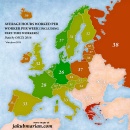 |
Average hours worked per worker per week in Europe
The following map shows the number of hours workers in each country work per week, on average, including both full-time and part-time (...)
September 27, 2017 – Jakub Marian – Maps
|
 |
Integral of $\cot(x)$
To integrate cot(x), recall that cot(x) = cos(x)/sin(x), so ∫ cot(x) dx = ∫ cos(x)/sin(x) dx. (...)
September 21, 2017 – Jakub Marian – Mathematics
|
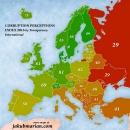 |
Corruption Perceptions Index of European countries
A map shows the Corruption Perception Index of European countries published by Transparency International. (...)
September 19, 2017 – Jakub Marian – Maps
|
 |
Pronouns in Esperanto
The system of pronouns in Esperanto is very similar to the English one: mi (I), ni (we), vi (you), li (he), ŝi (she), ĝi (it), ili (they). (...)
September 16, 2017 – Jakub Marian – Esperanto
|
By the way, have you already seen my brand new web app for non-native speakers of English? It's based on reading texts and learning by having all meanings, pronunciations, grammar forms etc. easily accessible. It looks like this:
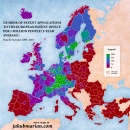 |
Number of patent applications per capita by region in Europe
The number of patent applications is a good indicator of how innovative businesses in different regions are. Without further ado, let’s (...)
September 7, 2017 – Jakub Marian – Maps
|
 |
Integral of $\sin(x)\cos(x)$
The function $\sin(x)\cos(x)$ is one of the easiest functions to integrate. All you need to do is to use a simple substitution $u = (...)
September 6, 2017 – Jakub Marian – Mathematics
|
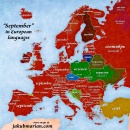 |
‘September’ in European languages
The English word “September” comes from Latin september, which means “the seventh month”. This seems strange—we all know that September (...)
September 4, 2017 – Jakub Marian – Maps
|
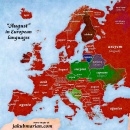 |
‘August’ in European languages
The English name “August” comes from Latin augustus, named in honour of Augustus, the first Roman emperor and great-nephew and adoptive (...)
August 1, 2017 – Jakub Marian – Maps
|
 |
‘In an alphabetical order’ vs. ‘in alphabetical order’ in English
The word “order” is usually treated as an uncountable (mass) noun, which means that it is normally not combined with an indefinite (...)
July 27, 2017 – Jakub Marian – English
|
